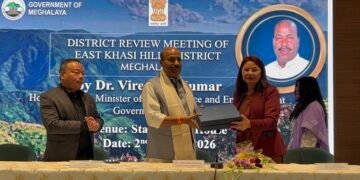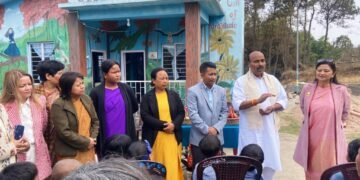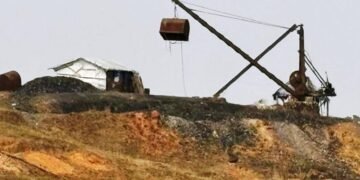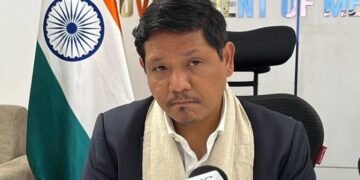Hemanta for the Khasi-Pnar – hold on a second, is this a trick which seeks to enable us Khasi-Pnars to turn our distaste of the people of the plains into a rich and an overflowing kindness essentially towards the Assamese, or is it that there is a virtue we possess that Hemanta sees in us and if it is what virtue might it be?
Have we not already expended every virtue we possessed in the past fifty years and left ourselves strapped of anything virtuous and are we to believe that some innate virtue is still hibernating somewhere in our being? Or is it political kindness? Perhaps it’s a little of everything because ultimately this is an undeniably interesting move in relationship building.
In our relations with people who are bold and bashful about their feelings as Hemanta is, openly displaying our happiness at the approval to grant a Development Council for the Khasi-Pnar race in Assam is unwise; we must be capable of dissimulation, else he may feel a sudden dislike towards us when he catches us in the enthusiasm of an elevated feeling at the prospect of the Khasi-Pnar being given a Development Council Status in Assam.
If he did, there is every likelihood he would have seen into our innermost hidden secret. Yes this is precisely what has caught the enthusiasm of many of the Khasi-Pnar community after receiving, albeit on WhatsApp, that among the key Cabinet decisions taken on the 16th November 2023 one was that the “Khasi Jaintia Developmental Council in Assam” has been approved.
If only Hemanta knew us better he would have altered the nomenclature to Khasi-Pnar Development Council in Assam. The immediate feedback I got when I forwarded the message to a friend was, “this is the best thing to hear. The Khasi Jaintia Development Council I mean. Once it takes off, which it will, because it is under Hemanta and I have a feeling he is determined to prove the point that the Khasis and Jaintias under Assam are far better off than their Meghalaya counterparts……” This plain simple off the cuff comment is appreciated but the more diplomatic comment would have been the one that makes Hemanta feel good, we need to make him laugh or voice out a cold witty sarcasm. But let me put it in another way instead of drawing conclusions.
There was a time when the Assamese and the Khasi-Pnars were so close that nothing could obstruct their friendship and brotherhood and only a small obstacle remained in the way of their long lasting friendship and that was language.
Now just about the time when the Khasi-Pnar were beginning to take up Assamese as the third language, English and their native language holding the first and second spot, the Assam government decided to impose Assamese upon the Khasi-Pnar and that brought about the movement that culminated in a statehood for the Khasi-Pnar along with the Garos.
No longer were the Khasi-Pnars interested in associating with the Assamese and with tears in their eyes many Assamese sold their Assam type houses to the Khasi-Pnars and left with more than just plain regret that their beloved Shillong would no longer be theirs to call home.
Perhaps even to this day there are those that still feel pangs of hurt when they come to Shillong for a short visit. Since then rivers and hills have separated the two races, and even if we wanted to get together again we couldn’t there was no way out of the fixed settlement that had alienated the two.
But on hearing that the Khasi-Jaintia Development Council has been approved the intellectuals among the Khasi-Pnar marvel and feel a heaviness in their heart, a heaviness of joy for their brethren in Assam, and an appreciation that the Chief Minister of Assam, without any pressure from any angle, has taken the first step in promoting the welfare of our brethren across the border.
Hemanta is no mere Assamese…he is an event in the North East perhaps an event in the entire country. His attempts at bringing about progress and a corruption free Government in Assam have paid off and now he stands at par with any leader in the country. In him people see an overcoming of the past corrupt regimes in Assam, a kind of a self overcoming on the basis of local inputs and dependence so much so that Assam is on the verge of being the only State in the North East capable of providing for its requirements from its own resources.
In fact it now generates enough revenue to meet its own requirements and still has enough to contribute to the Centre for the overall growth and development of the country. With such flourishing revenue is there any wonder that he now dares to display a benevolence to declare the Khasi-Jaintia Development Council for the areas where the Khasi-Pnars are the dominant race?
The Khasi-Pnars in Assam have long been ignored perhaps even looked down upon by the Government as an infection, therefore the idea that they now will have a Developmental Council is the first relatively innocuous sign that there lot will now be better than before and perhaps better than their counterparts in Meghalaya: yes Hemanta is capable of something like that.
I can sense that the above statements will be taken with a bit of salt and open to some misunderstanding, and on certain faces I can imagine there will be the expression of contempt. Perhaps there will even be those who will laugh the entire matter away, but I prefer that I be understood here as in other things.
The state of affairs of the Khasi-Pnars in Meghalaya is nothing to be too happy about. Basically they are being discriminated against, manipulated and their condition is generally bad. Decay is everywhere. A psychological illness lies at the root of things – they are not its cause – but because of the gay abandon they normally engage in, they have accelerated the fall of their society in Meghalaya…and most of them are quite prepared to admit that they have done it in a way which makes them recoil with horror at the progressive decline and fall. They were decadent and others were all too keen to take advantage of this attitude of theirs.
Look around you and you will see for yourself that the statements made are so very factual that we struggle to argue against them…other races have taken advantage of us. What was our fall was that our leaders had no organising power, they abused the traditional means of upbringing and no one was wise enough to detect what it was we were ushering in. But what does all this have to do with what Hemanta is doing for our people in Assam?
Hemanta is famous now especially with the “Malegaon Flyover Project” that was completed in less than the stipulated time relieving commuters of the time they spend driving. I do not know if there is any other politician who can boast of being able to get things done on time in the entire North East. But now let us take a breath and withdraw a moment from this narrow mindedness which necessarily must be narrow for us in Meghalaya because we have to make comparisons between our leaders and the leaders we have in the region.
Leaders either have the virtue of an ascending lifestyle, in which case they resist the vices of degeneration with all their deepest instincts, or they are themselves a degeneration in which case they regard degeneration as a virtue. It is up to us to assess the kind of leaders we have in Meghalaya and I suspect I know what the majority opinion on this aspect is…I need not mention more, except that it is clear that Hemanta is ready to show us all that he is more than able to uplift the Khasi-Pnars in Assam, even more than the Khasi-Pnar are being uplifted in their own State. And that is what I think is his agenda.
With all this I do not wish to imply that I regard Hemanta a better leader than anyone else in the North East, and least of all in those places where love of race is more than love of anything else. The only fact I am trying to bring forward is that in politics literary evidence is the basis of the quality of the leader and we feel good on hearing a good policy. We have to learn how to express gratitude no less than to express contempt. Anyone who introduces a good policy discovers with some amazement how clumsy and poor people are in their capacity for expressing gratitude – and how rarely gratitude is expressed at all.
Right now there is so much that the Khasi-Pnar community are not getting from their leaders in Meghalaya that when we read about the Khasi-Pnar Development Council in Assam we sense a good feeling in our entire being for the Khasi-Pnar there. I often argue that we leave ourselves at home when we go beyond the boundaries of the Khasi-Pnar hills – maybe in the near future when we go to the regions in Assam where the Khasi-Pnar Development Council will extend we might just carry everything along – another place where we feel at home.



























